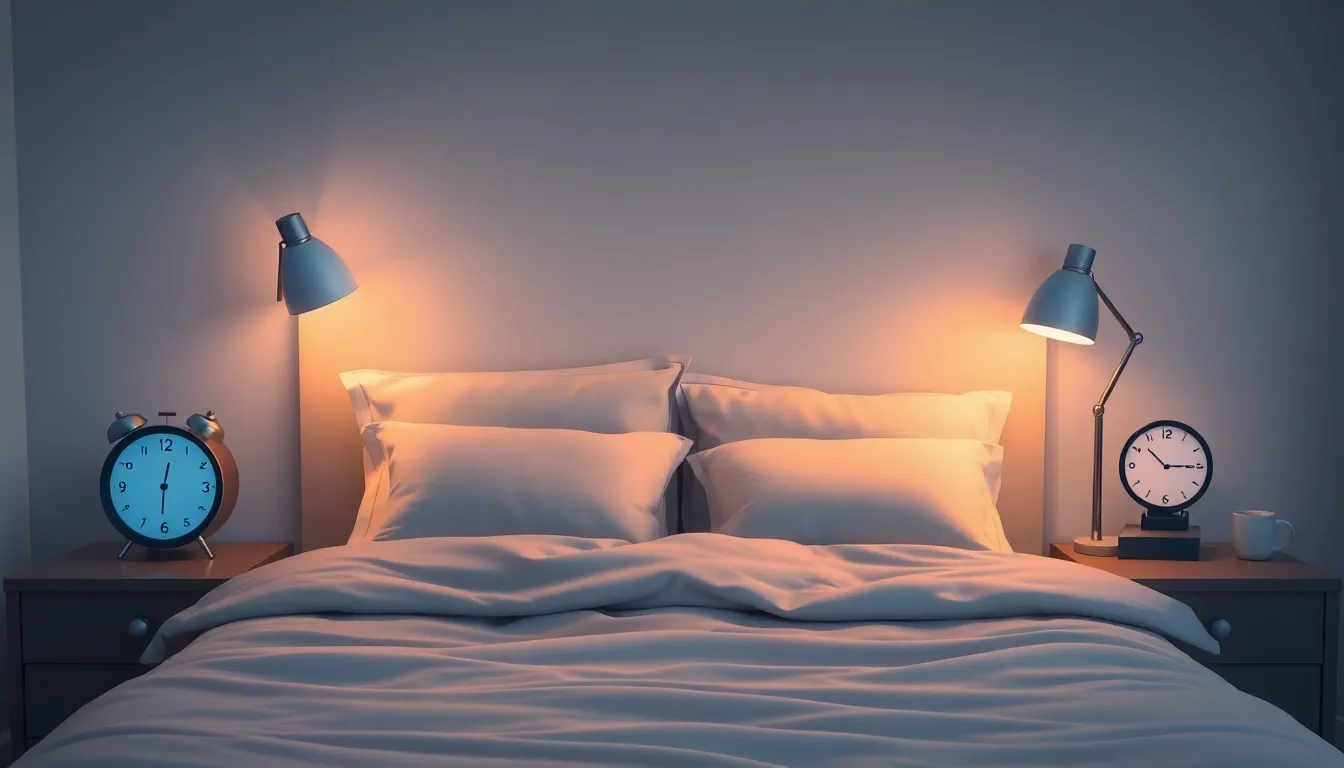Sleep is often seen as a luxury, but it’s actually a necessity. Imagine trying to function on a low battery—frustrating, right? In a world where hustle culture reigns supreme, understanding the science of sleep can be your secret weapon for better productivity and mood.
Table of Contents
ToggleOverview of the Science of Sleep
Sleep plays a vital role in overall health and well-being. Understanding its underlying science reveals how essential sleep is to daily functioning and quality of life.
Importance of Sleep
Sleep affects cognitive functions, emotional stability, and physical health. Insufficient sleep correlates with increased risks of chronic illnesses, including obesity and diabetes. The World Health Organization states that adults require 7 to 9 hours of sleep regularly for optimal health. Proper sleep not only enhances memory and learning but also strengthens immune responses. A well-rested individual demonstrates improved reaction times and decision-making abilities, supporting higher productivity levels.
Key Functions of Sleep
Sleep serves multiple key functions that sustain physiological balance. It facilitates the consolidation of memories, transferring information from short-term to long-term storage. Sleep helps repair and regenerate tissues, promoting healing and growth. Hormonal regulation occurs during sleep, balancing hormones related to stress, appetite, and metabolism. Notably, REM sleep contributes to emotional resilience by processing experiences and emotions. Overall, these functions highlight how integral sleep is to maintaining physical and mental health.
Sleep Stages and Cycles

Understanding sleep stages and cycles enhances awareness of their impact on health. Sleep consists of two primary types: REM (Rapid Eye Movement) sleep and non-REM sleep.
REM Sleep
REM sleep occurs approximately every 90 minutes within the sleep cycle, lasting around 20 to 25% of total sleep time. During this stage, brain activity resembles that of waking hours, supporting vivid dreaming. Memory consolidation thrives in REM sleep, strengthening learning and emotional stability. The body experiences temporary muscle paralysis, preventing acting out dreams. Additionally, REM sleep contributes to brain development and emotional regulation, making it essential for overall mental health.
Non-REM Sleep
Non-REM sleep can be divided into three stages, characterized by gradual transitions from light to deep sleep. Stages one and two account for about 50% of total sleep, marking the initial descent into sleep and light sleep, respectively. Deep non-REM sleep occupies stage three, which plays a vital role in physical recovery and growth. Hormonal regulation, tissue repair, and immune response strengthening primarily occur during non-REM stages. Achieving sufficient non-REM sleep enhances overall health, cognitive functions, and emotional resilience.
Factors Affecting Sleep Quality
Numerous elements influence sleep quality, including environmental factors and lifestyle choices. Both aspects play crucial roles in achieving restorative rest.
Environmental Influences
Noise levels significantly impact sleep. Studies indicate that exposure to loud sounds can disrupt sleep patterns. Light, especially blue light emitted by screens, hinders melatonin production and delays sleep onset. Room temperature also matters; a cooler environment promotes better sleep. Additionally, an uncomfortable mattress or pillow can lead to physical discomfort, making deep sleep harder to achieve. Creating a sleep-friendly environment contributes greatly to restful nights.
Lifestyle Choices
Daily routines affect sleep significantly. Regular exercise helps regulate the sleep-wake cycle, while excessive caffeine intake from coffee or energy drinks can lead to insomnia. Eating heavy meals too close to bedtime disrupts the ability to fall asleep easily. Establishing a consistent sleep schedule encourages the body to recognize when it’s time to sleep. Stress management techniques, such as meditation or deep breathing exercises, also enhance overall sleep quality. Prioritizing healthy habits fosters better rest and contributes to overall well-being.
Sleep Disorders
Sleep disorders significantly impact overall health and quality of life. They can disrupt normal sleep patterns, leading to various physical and mental health issues.
Insomnia
Insomnia refers to persistent difficulty in falling asleep or staying asleep. Affecting about 30% of adults, it leads to fatigue and reduced daytime functioning. Many individuals experiencing insomnia report feelings of irritability and difficulty concentrating. Causes often include stress, anxiety, and certain medical conditions. Treatment options encompass behavioral therapies, relaxation techniques, and medication. Cognitive Behavioral Therapy for Insomnia (CBT-I) has shown effectiveness in improving sleep quality.
Sleep Apnea
Sleep apnea is characterized by interrupted breathing during sleep. This condition affects approximately 22 million Americans and can lead to serious health consequences. Individuals often experience loud snoring and excessive daytime sleepiness. Treatment typically involves lifestyle changes, such as weight loss and the use of Continuous Positive Airway Pressure (CPAP) therapy. CPAP machines help keep airways open during sleep. Recognizing and addressing sleep apnea is crucial for preventing complications like heart disease and high blood pressure.
Tips for Better Sleep
Improving sleep quality enhances overall health. Implementing effective strategies makes a significant difference.
Establishing a Sleep Routine
Creating a consistent sleep schedule strengthens circadian rhythms. Going to bed and waking up at the same time daily boosts sleep quality. Prioritizing wind-down activities, such as reading or meditation, helps signal the body it’s time to relax. Limiting screen time an hour before bed reduces exposure to blue light, which can interfere with melatonin production. Avoiding heavy meals and caffeine close to bedtime supports restful sleep. Adhering to these practices fosters an environment conducive to restful nights.
Sleep-Friendly Environment
Designing a sleep-friendly environment promotes better rest. Keeping the bedroom dark, cool, and quiet creates optimal conditions for sleep. Investing in a comfortable mattress and supportive pillows improves comfort during sleep. Utilizing blackout curtains can block external light sources effectively. Sound machines or earplugs manage distracting noises, enhancing tranquility. Incorporating calming scents, like lavender, may also encourage relaxation. Cultivating this environment significantly contributes to improved sleep quality and overall well-being.
Conclusion
Prioritizing sleep is essential for maintaining optimal health and well-being. By understanding the science behind sleep and its various stages, individuals can make informed choices to enhance their rest. Implementing practical strategies like establishing a consistent sleep routine and creating a conducive sleep environment can significantly improve sleep quality.
Recognizing the impact of lifestyle choices on sleep is crucial. From managing stress to limiting screen time before bed, small adjustments can lead to substantial benefits. Addressing sleep disorders early on also plays a vital role in ensuring long-term health. Embracing these insights can empower individuals to achieve better sleep and ultimately enhance their overall quality of life.




